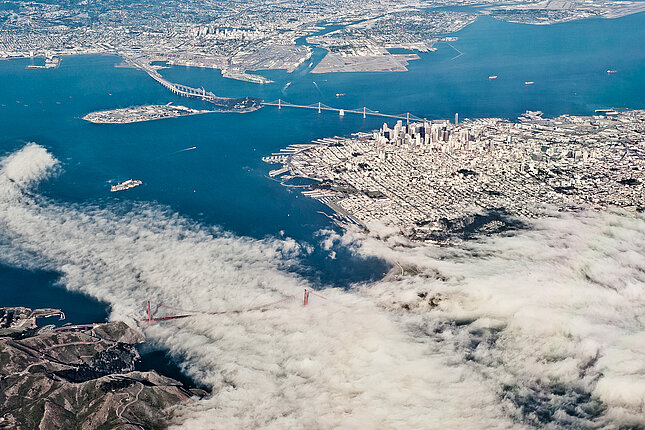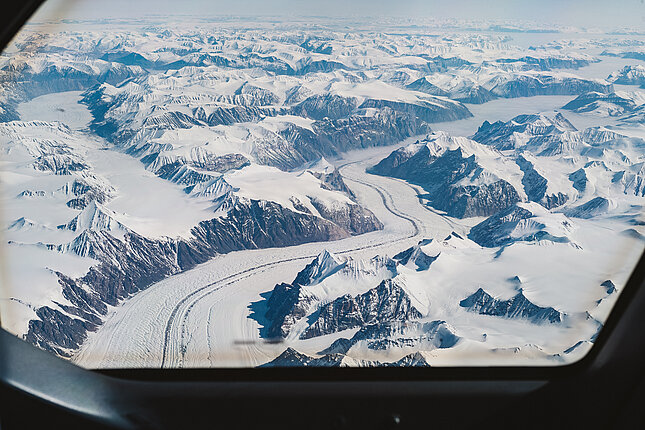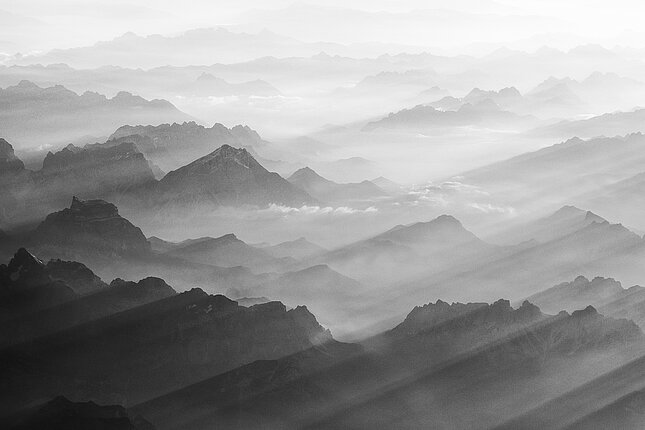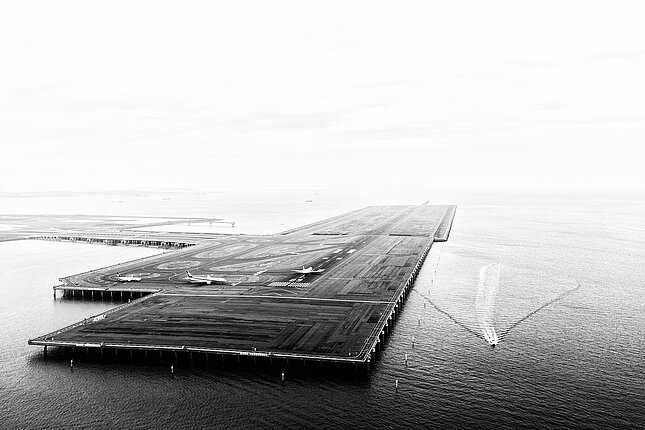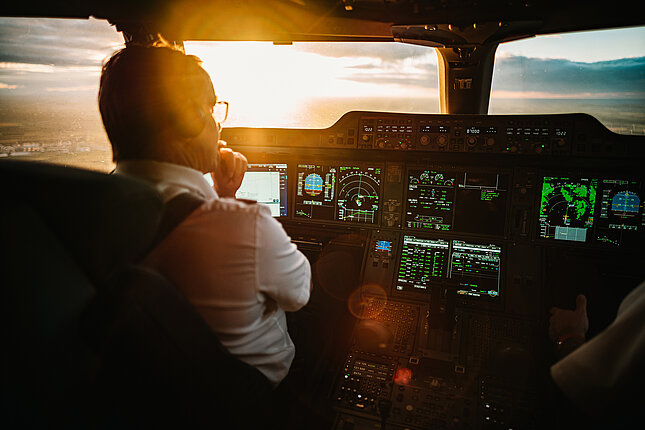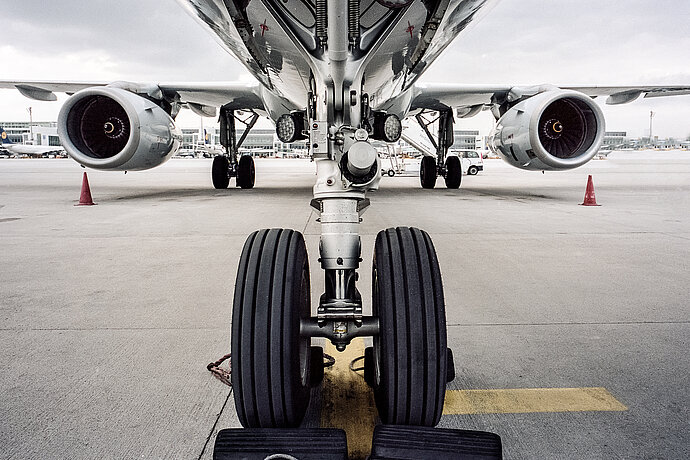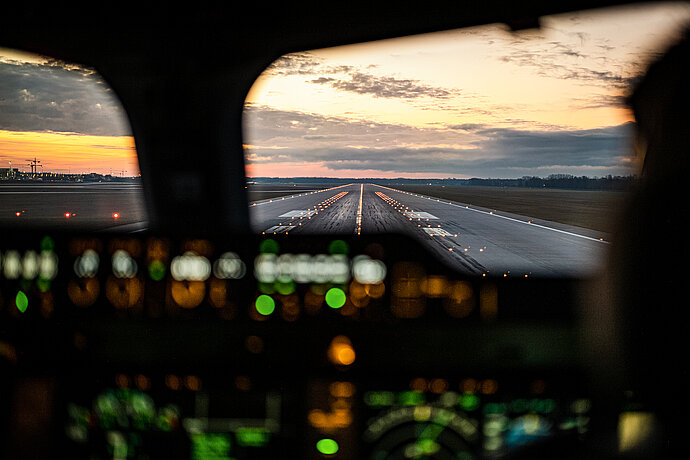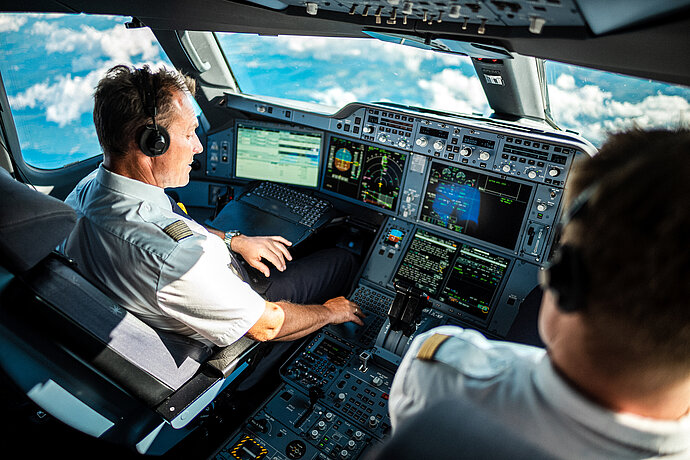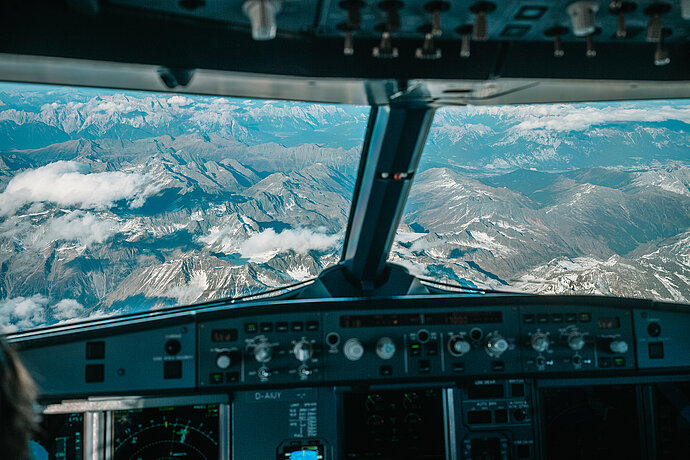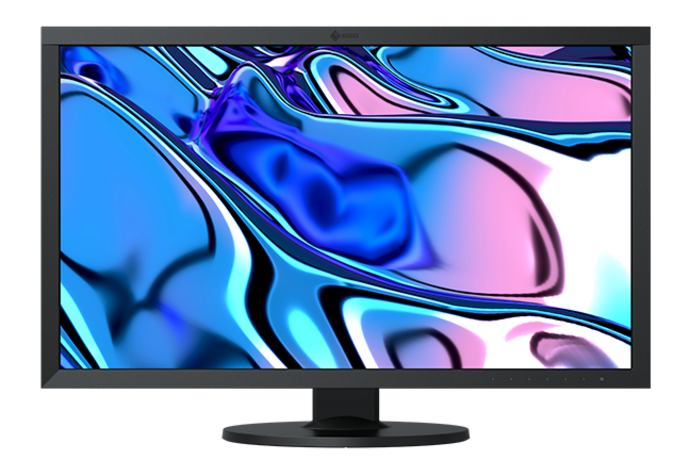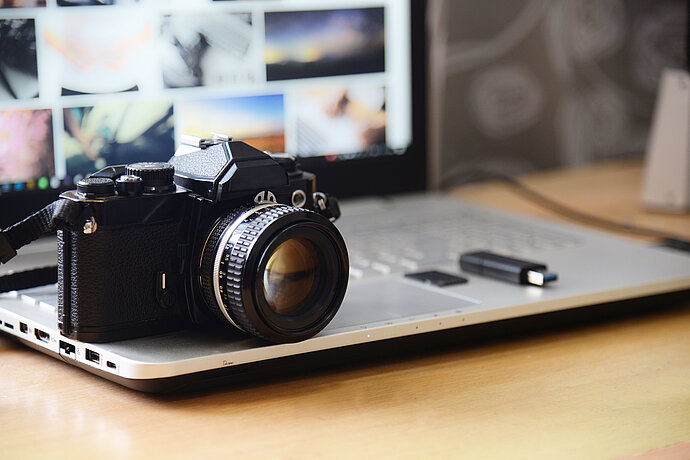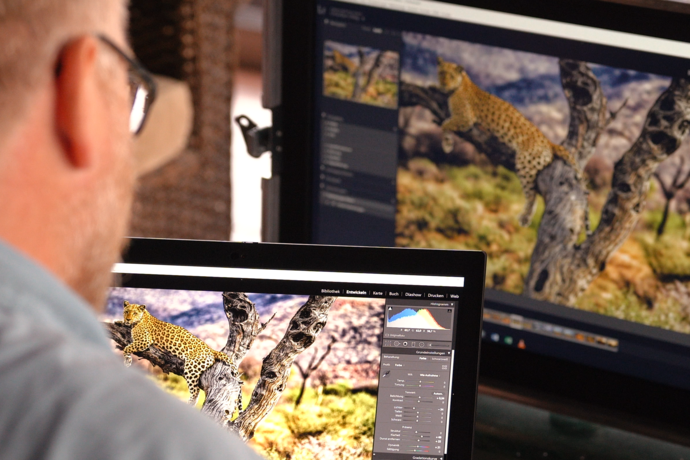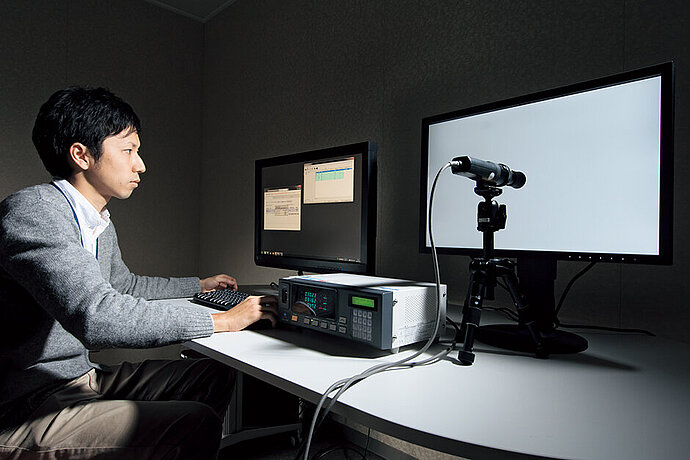Mehrdad Abedi’s job takes him all over the world. And wherever he goes, he always has his camera gear with him. As a flight attendant his job allows him to indulge in his passion for travel photography. It also gives him access to areas off-limits to passengers.
ColorEdge Case study
The view (from) inside the cockpit
Spectacular views from the cockpit windows: Flight attendant and travel photographer Mehrdad Abedi uses the ColorEdge CS2731 for image processing.
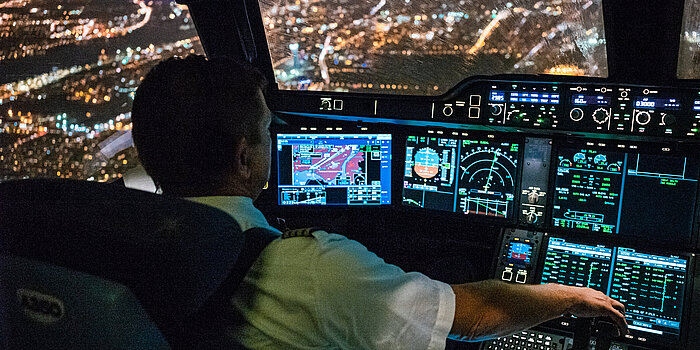
To work on his photos at home, Mehrdad was searching for an external monitor he could connect to his high-end laptop that he wanted to use as a desktop replacement. And he found just what he was looking for in the ColorEdge CS2731.
Over a period of three-plus years he put together a collection of photos that gives a fascinating look inside the cockpit of a commercial airliner while also providing us with spectacular photos taken out the window of the aircraft cabin.
Mehrdad Abedi serves as purser, or chief flight attendant, on long-haul flights with destinations around the world. He discovered his passion for photography as a teenager which continues to this day. It all began with his father’s Canon F1. From there he upgraded to a Leica M10, which he still uses, staying true to his roots in analogue photography. On his blog you can find at qimago.de, Mehrdad, a civil engineer by training, enjoys testing the latest cameras and lenses.
At home around the world
Mehrdad has the perfect job. It allows him to marry his passion for travel, street and landscape photography with the many places his work takes him. Because he works long-haul – not short-haul – flights, he doesn’t have to stay on board for the return leg of the journey. Instead, he has time to spend on the ground at the end of his shift. You couldn’t ask for anymore if you’re an avid photographer. “I use the time I have off between flights to take photos when I’m abroad. That’s one of the advantages of my job. On the downside, of course, one is rarely home,” says Mehrdad, explaining the pros and – often – cons of being a chief flight attendant.
A fascinating place to work
Over time the focus of his photography shifted more and more to his workplace. As a flight attendant he has access to areas which are strictly off-limits to passengers. This includes the cockpit and airfield. Mehrdad realised the potential from an artistic perspective and decided to use the areas inside and outside a plane as the subject of a long-term photography project. “The cockpit is a magical place,” the native Berliner says in explaining what fascinates him about his work. “There are countless gauges, monitors, buttons, lights, levers, knobs and dials. And then there’s the pilot and co-pilot who form a highly focused, well-oiled team, even if they’ve only just met. They follow a set of prescribed procedures to keep the massive weight of the fuelled-up plane, which is made up of carbon fibre and metal, up in the air.” And if that wasn’t enough, one can look out the cockpit window and see the world’s great cities, other spectacular scenery like snow-covered mountain tops, towering cloud formations and the sea of lights to be observed above large urban centres. That explains why there are very few times when Mehrdad doesn’t have his compact, mirrorless camera with him. “When I’m on duty, I spend most of my time focused on my work and tending to passengers’ needs,” emphasises Mehrdad. “Luckily, however, I have enough time during my breaks to take in all the wonderful things that working on a plane open up to us and capture this on film,” he says with great enthusiasm. “Despite all the stress and the many challenges we face in our jobs, we should never lose sight of the fact that we are witness to extraordinary things every day.” When building activity slowed down in the early 2000s, Mehrdad, who holds an advanced degree in civil engineering, wanted to work in civil aviation as a one-off. Nothing permanent. He enjoyed the work so much, he decided to stay on. And he’s still on the job today, as you can see in his photos.
Mehrdad’s photos capture the cockpit as well as the view from the aircraft cabin. Unlike passengers whose view is limited to the windows on the side of the plane, the cockpit crew is able to enjoy the view from the front of the craft. While the crew’s primary focus during take-off and landing is on the instrument panel, they can sit back and take in the scenery below once the plane has reached cruising altitude. All this is captured in Mehrdad’s photos. When documenting his journeys, he’s been able to link the inner workings of the cockpit with the spectacular scenery seen passing by below. This allows him to take aerial photos that would not be possible with a quadrotor drone or helicopter. That’s because they’re taken when the commercial aircraft is in the flight lane during take-off and landing.
One computer for all his needs
Along with his small bag of camera gear, he always brings his MacBook Pro with him, too. He uses it to check his photos, post messages, update his blog and keep in touch with family. Up until recently, Mehrdad also had a desktop computer at home. It was getting old and the laptop he now had was so powerful that he really didn’t want to keep two computers around any longer. With that in mind, he set about looking for a way to integrate his laptop into his desktop workflow. “I was tired of having to use multiple computers,” says Mehrdad. He wanted to find a way to avoid the hassle of having to synchronise data, programs and settings.
ColorEdge CS2731
However, he still wanted to use a dependable, large-format monitor. “The display on a laptop is too small for editing photos. The glossy screen, which has an extra layer of glass overlaid on it, is not really ergonomic. Plus, my laptop is not well-suited for soft proofing, even after calibration,” says Mehrdad as he explains how he went about searching for an external graphics monitor for his desktop workstation. He found the monitor he was looking for: the ColorEdge CS2731 from EIZO. “Once I plug my MacBook into the USB-C port on the CS2731, I’m integrated into the entire desktop workflow. The peripherals, that is the keyboard, memory card reader and hard drives, are all connected to the CS2731. My Mac is even powered via the USB-C cable. It does not get any simpler or easier than that.” By buying an external monitor, the flight attendant/photo blogger is now able to use his laptop as a desktop replacement. This allows him to work from home with absolute precision. It also gives him ample space to edit photos on the desktop. As an added bonus, he can use the same setup regardless of whether he’s at home or not, all without having to synchronise, copy or configure two computers.
“The CS2731 is exactly what I was looking for,” says Mehrdad. “Thanks to its EX4 sensor and ColorNavigator software, the monitor self-calibrates in no time. It displays the image files exactly as they will appear, which is what it should do. It does exactly what I ask of it, allowing me to focus on the creative side of photography.”
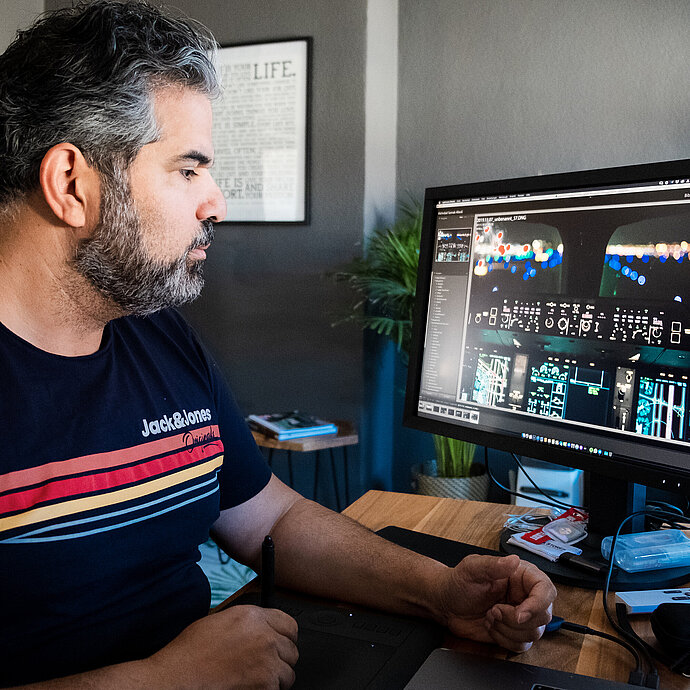
qimago photography blog
Mehrdad’s passion for photography extends to cameras and photography gear as well. For several years he has run the photography blog qimago.de. It initially began in 2007 as a platform to share photos with family and friends. Then, in 2012, it was opened up to the public when several other photographers also came on board. Once an insider tip among photographers, the website now has a loyal group of readers. His blog covers a number of subjects in and around photography and features reviews of photographic equipment.
Go to www.qimago.de to find out more.
